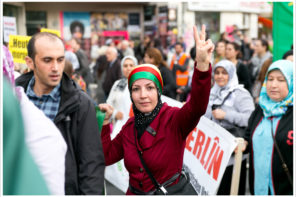This is all over the newspapers: MPs have found that the United Kingdom detains ‘far too many [migrants] unnecessarily and for far too long’. This makes the system ‘expensive, ineffective and unjust’.
Such are the conclusions of the cross-party parliamentary inquiry which, for the last six months, had heard directly from current and former detainees about what immigration detention really means in practice.
We are told, members of the parliamentary panel were ‘shocked’ by some of the testimonies they heard. They are now convinced that ‘little will be changed be tinkering with the pastoral care or improving the facilities’. They say, immigration detention must become a last resort and not be allowed to go on for over 28 days.
Activists are over the moon. The most optimists amongst them think that this may prove to be a turning point in UK immigration detention policy. Academics are more circumspect and offer a more sober assessment of the inquiry’s likely impact.
As for me, I want to ask a slightly different question.
The United Kingdom is a party to the European Convention on Human Rights (let us hope this lasts), and the final interpreter of the Convention is the European Court of Human Rights. How come, then, have we not heard the Strasbourg Court denouncing immigration detention?
The Saadi case
The leading case from Strasbourg in this area is Saadi v. the United Kingdom. It was decided by the Grand Chamber in January 2008. The applicant was a doctor who had fled Iraq after treating opponents to the regime. On arrival at Heathrow Airport, he had immediately claimed asylum. Three days in a row, he had been told to find boarding at a hotel of his choice and to report to the airport the following morning. As he did this for the third time, the authorities detained him. Dr Saadi was obviously not an absconding risk. Why was he detained? The purpose of the detention was to facilitate the process of determining his asylum claim by having him at hand for any interview that the authorities might want to hold with him. Although his detention did not last long (seven days), it seemed to go against the very foundation of guaranteeing human rights and prohibiting deprivation of liberty except when this is absolutely necessary.
Despite the detention not being a last resort here, the Court ruled that there had been no violation of the Convention in this case. This conclusion means that it is now officially lawful under the Convention to use immigration detention merely for administrative convenience (as long as the conditions of detention are appropriate). Out of the seventeen judges who constituted the Grand Chamber in Saadi, six judges found the outcome abhorrent. They ended their dissenting opinion with the following words:
Are we now … to accept that Article 5 of the Convention, which has played a major role in ensuring controls of arbitrary detention, should afford a lower level of protection as regards asylum and immigration which, in social and human terms, are the most crucial issues facing us in the years to come? Is it a crime to be a foreigner? We do not think so.
When Humans Become Migrants
My book When Humans Become Migrants identifies the legal and social factors that explain why the European Court of Human Rights has had so little to say against immigration detention – and other issues that are of equally crucial importance to migrants.
Going back sixty years, I trace the limits of the protection that the drafters of the Convention were intending to bestow refugees and other migrants. I examine cases that were lodged at Strasbourg by migrants in the 1960s and 70s in order to understand why, despite their high number and arguably sound arguments, they were invariably declared inadmissible.
These decisions demonstrate that principles unfavourable to migrants’ rights were established in the very early days of the system. I argue that, because of this, it was always going to be difficult for migrants to successfully claim they had rights under the Convention – as a result, there is for example no right to family reunion in European human rights law.
I carefully review the cases where the Strasbourg Court has found violations of the Convention in migrant cases. In the last analysis, these victories are often better characterised as being mitigated rather than resounding.
Moreover, once verdicts of non-violation but especially inadmissible decisions are taken into consideration, findings of violation appear to be actually few and far between. Needless to say, it is these few latter verdicts that make it into the media limelight, feeding the myth that Strasbourg is soft on migrants and hard on states. The truth, I argue, might well be more the other way around.
On the positive side
Even so, it is important to stress that what I call the mainstream is only part of what is happening at Strasbourg; for this mainstream has always been counteracted by an undercurrent of progressive judges. These have fought hard, sometimes with great success such as in M.S.S., to get migrants’ rights protected.
Another point upon which I insist is that verdicts that leave states off the hook need not be viewed as the most logical outcome of human rights law. Human rights law can protect migrants. Powerfully argued Strasbourg dissenting opinions in cases such as Saadi show this. The book also makes this point by reference to the Inter-American system of human rights protectiovet.
There have been a string of cases that the Inter-American Court of Human Rights, based in San José, Costa Rica, has used in order to expand migrants’ rights. For example, in Vélez Loor v. Panama, it has firmly declared that immigration detention can only ever be a last resort, which must moreover be surrounded by stringent due process guarantees, including legal representation by a qualified lawyer (not just a NGO).
Human first or second?
In short, the book shows that the Inter-American Court approaches migrants first as human beings who have human rights. This is in contrast to the European Court who, possibly fearful of being accused of encroaching upon state sovereignty, tends to view them first as ‘aliens’ primarily subject to the control of the state. These trends are explained by reference to the social, political and legal of the European and Latin American regions, at the same time as avenues for a more progressive Strasbourg jurisprudence are delineated
Marie-Bénédicte Dembour is Professor of Law and Anthropology at the University of Brighton. If you are interested in my arguments, but do not wish to delve into the book, you can listen to my podcasts.










